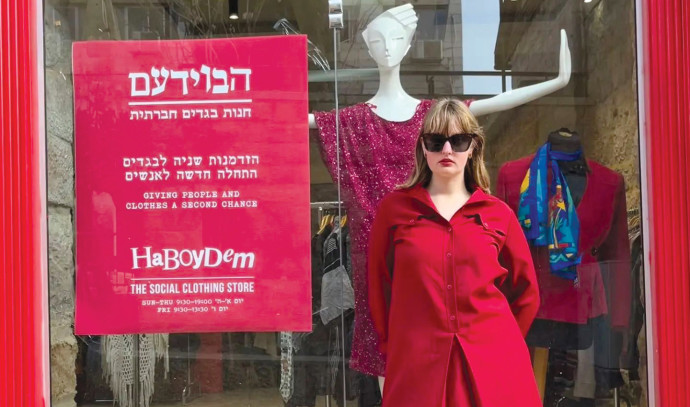Customers of all ages and income levels stream through the inviting red doors of Haboydem (The Attic) secondhand store on Rivlin Street off Jaffa Road seeking bargains on new and like-new clothing displayed in a cheerfully renovated former pub.
These customers are not just saving money and taking a stand against the highly polluting fast-fashion industry. They’re also passively training the employees of this social business run by the nonprofit Organization for Rehabilitation and Integration (Shaf Yativ).
Haboydem’s two locations, one in Talpiot and one in the center of town – which moved to Rivlin Street in February – work with the Health Ministry’s transitional employment programs for people with mental health challenges, aiming to enter or return them to the workforce.
Each year, 15 to 20 Haboydem trainees receive professional support from Shaf Yativ’s occupational therapist plus paid on-job training in all operational aspects, such as sorting donated clothes, customer service and sales transactions.
After six months or a year, each receives assistance finding a job in a normative work environment and maintaining employment over time. There’s an 80% success rate in this endeavor; some come back for another try.
“Giving People and Clothes a Second Chance” is the motto of the shops, which now supply most of the NGO’s budgetary needs for its shelter program and other activities for people with mental challenges.
“We’re lucky that the world of secondhand has become so accepted. Thank God, business is good,” says branch manager Nechama “Chumz” Scholar, a bilingual 30something mom who came to her position five years ago with experience in retail and social projects.
“Before corona, we didn’t know how the store would sell our teenage clothing. Our clientele used to be older people and artsy people. But now teenagers are always coming in. We get a lot of people who never came to the previous store,” says Scholar, speculating that post-pandemic financial difficulties and environmental awareness have contributed to the boom in vintage.
The store’s ambiance suggests quality in both the merchandise and the retail standards, making a clear statement to employees and customers that Haboydem is not selling shmattes (rags), as Scholar puts it.
“It is not easy to deal with people who are dealing with their pain, to help them see their strengths when they cannot see their own strengths. It’s also not easy for them to work with customers who sometimes hassle and haggle.”
Guy Avihod
Helping rehabilitate those with mental health conditions
The employee-trainees are rehabilitating from a variety of mental health conditions, including post-trauma effects, and either never held a job or have had difficulty keeping one.
“It’s a place to show people what their life could be like,” Scholar explains. “A life maybe they didn’t think they could have because they may not ever have felt self-worth. At the store, we send them a message that they are worth something, that they are respected and seen. One of our top priorities is working through the negative things and bringing out the things that are amazing about them.”
She points out that salesmanship requires responsibility, communication and “pretty much everything you need in life so you can go on to be whatever you want to be.”
Not everyone will go into sales afterward. But one hard-won success involved a young woman who was singled out for excellence in her job at a popular accessories store after training at Haboydem – twice.
Guy Avihod, head of the organization, explains that this young woman – we’ll call her Shani – came to them with serious personal boundary issues (“She would tell everybody everything about herself”) and had never been able to hold a job.
“My wife, Eris, the manager of the Talpiot store, took her under her wing as her assistant. She was with us for a long time, and still it was very hard for her to find a job,” says Avihod.
“It is not easy to deal with people who are dealing with their pain, to help them see their strengths when they cannot see their own strengths. It’s also not easy for them to work with customers who sometimes hassle and haggle.”
Shani’s family almost gave up hope. “They were preparing to send her to a sheltered workshop, where she would not have been able to make the most out of herself,” says Avihod.
Just in the nick of time, Shani landed a job at an accessories store. The beginning was rocky. When a secret shopper came in to observe and rate employees, Shani scored 45 out of 100 points.
“Our supportive employment specialist took the evaluation as a learning experience, and they worked together on her weak points. Two months later, [Shani’s] secret shopper score was 95. She eventually became worker of the month based on how well she was selling,” says Avihod.
Unfortunately, her tribulations weren’t over. Shani and her husband became parents, and the birth triggered serious postpartum depression requiring hospitalization. She was unable to continue working.
“We asked her back to Haboydem for a short time so she could remember her strengths and not feel like she was regressing,” Avihod says.
“She worked in the store in town three times a week, and after three months felt confident enough to go back to [the accessories store]. Recently I got an SMS telling me that she was named best salesperson of the week. It was very emotional because there were so many ups and downs along the way,” he says.
“This story shows we have flexibility. The rehabilitation plans are tailored to each person. We used to do a one-year program only but now also have a six-month program for those who need a boost. Our hours of operation, 9:30 to 7, are not regular store hours, but we want people to succeed.”
Involving the community in the store’s mission is key.
“People want to give us the best clothes because they understand what we’re doing. The decision to come here to shop is not because it’s a charity but because it’s a classy store that has great clothes,” says Elie Lederman, a Shaf Yativ supporter and co-founder of Haboydem.
“We have ‘ambassadors’ in Ra’anana, Efrat, Jerusalem and other cities encouraging people to give us their best used clothing. I have three or four importers who give me surplus clothing with tickets on it, worth tens of thousands of shekels. It’s philanthropy without hitting anyone in the pocket. We’re having fun and the workers are having fun, and the community wants to contribute.”
Lederman says he encourages people to donate to and patronize any charitable thrift shop close to their heart “because there is no conflict of interest when it comes to hessed.”
Indeed, there are similar social businesses. SHEKEL-Inclusion for People with Disabilities employs people with special needs at HaMetzion thrift shops in Jerusalem, Tel Aviv and Ramat Gan, while AniShlishi runs its Second Chance shops providing occupational development for at-risk youth in Tel Aviv, Mevaseret Zion and Rishon Lezion.
Aside from donating clothing and volunteering in the stores, other forms of community involvement are available at Haboydem.
Micol Nizza, the organization’s community outreach coordinator, invites community groups, NGOs, schools, youth movements and corporate social programs to come and see Haboydem’s business model and learn about its dual goals relating to rehabilitation and sustainability.
“I explain the environmental connection between fast fashion and climate change. I tell them about the industry’s overproduction, depletion of natural resources, pollution – and about overconsumption and the exploitation of workers,” says Nizza.
“These are the stories I bring to the public, and I position Haboydem as one of the solutions. We can all take small actions like reducing consumption, buying secondhand and repairing clothing rather than throwing it away.
“I also explain the work we do in recovery and rehabilitation of people with mental issues, bringing them into the community and helping to reduce stigmas,” she says.
“The shops are like a training lab for helping people gradually gain confidence and the soft and hard skills to be able to integrate into the workforce. They all start in the Talpiot shop and then when they are more advanced, they come to Rivlin because it’s less about work behind the scenes, such as sorting, and more about serving customers, smiling, working the cash register.”
Sometimes students choose to fulfill their community service obligation as Haboydem volunteers. A whole class from a Jerusalem school helped move the contents of the city center shop to the present larger location.
First lady Michal Herzog cut the ribbon at the grand opening in March, and business has been brisk ever since.
Avihod feels that the Rivlin Street space itself is part of the experience. When renovations began, workers stripped the paint to expose its Jerusalem stone walls and filled in with faux stone where necessary.
“It used to be a sleazy, dark bar, and now it’s light and open,” he says, comparing the space’s physical tikkun, or repair, to the inner tikkun his organization strives to effect in Haboydem’s worker trainees. ❖
Haboydem: 1 Avraham Rivlin St. and 15 Tzeret St., JerusalemHours: Sunday-Thursday 9:30 a.m.-7 p.m.; Friday 9:30 a.m.-1 p.m.


